NYFF Dispatch 1: The Pre-Festival Begins
No Other Choice but to stan The Mastermind who achieved Late Fame by performing Miroirs No. 3.
The New York Film Festival officially begins on Friday, but for accredited members of the press and industry, we’re already well under way. NYFF is unique among the major festivals1 in that the bulk of its press screenings happens before opening night. I don’t exactly why, but I think it has to do with most of the lineup already having had their world premieres, plus fewer screening venues compared to other fests. (As much as we love to come to the AMC Lincoln Square for magic, it doesn’t have the same glamour as the Alice Tully Hall.) Showing most of the movies in advance of the public screening is also really helpful for critics, who get a bit more time before their festival reviews have to be published2.
Unlike the (excellent) Venice and Toronto dispatches I've been reading over the past few weeks, my experiences are far less glamorous. There will be a few glitzy parties throughout the festival, but not on the scale of other fests. More crucially, I'm not important enough to be invited to them. (Not yet at least!!) Also I live here, so there isn't any element of travelogue. The immediate area around Lincoln Center is culturally dead and I have to wake up early the next day for the next round of movies, so I'm just going home each night. These will pretty much just about the movies and what I’m eating in between screenings, a constant topic of discussion with my colleagues.
This pre-festival festival is similar to that of the music variety: if you max it out you can see four movies in one day. There’s a forty minute break in between each screening, which is twenty minutes too long and twenty minutes too short. A longer gap would allow a proper break for meals or writing. There is the eternal complaint about the dearth of restaurants in the immediate vicinity that are inexpensive, good, and filling (usually in this town you can pick two, here you’re lucky to get one). To that end I'm working on an update of my very popular dining guide that will be up later this week, and these dispatches will show some of that hands on (mouth on?) research.
So there’s a lot going on right now. Movies that require one’s full attention, eating kind of like a gremlin, and I’m also working my full-time job throughout it all. I clear my schedule as much as possible and get things done in between screenings and in the evening. Accordingly, these dispatches are pretty much initial impressions. I'll try to write more in-depth reviews when things slow down, which is ironically after the festival begins.
Wednesday, September 17
It’s day one of press screenings! Next to my subway stop is the only bagel shop in the vicinity of the Lincoln Center. I get my usual: sausage egg and cheese on whole wheat everything. (I famously don't eat breakfast but have to adapt for the next few weeks.) Broad Nosh is fairly busy so it takes ten minutes to get my sandwich, kind of an eternity for New York.
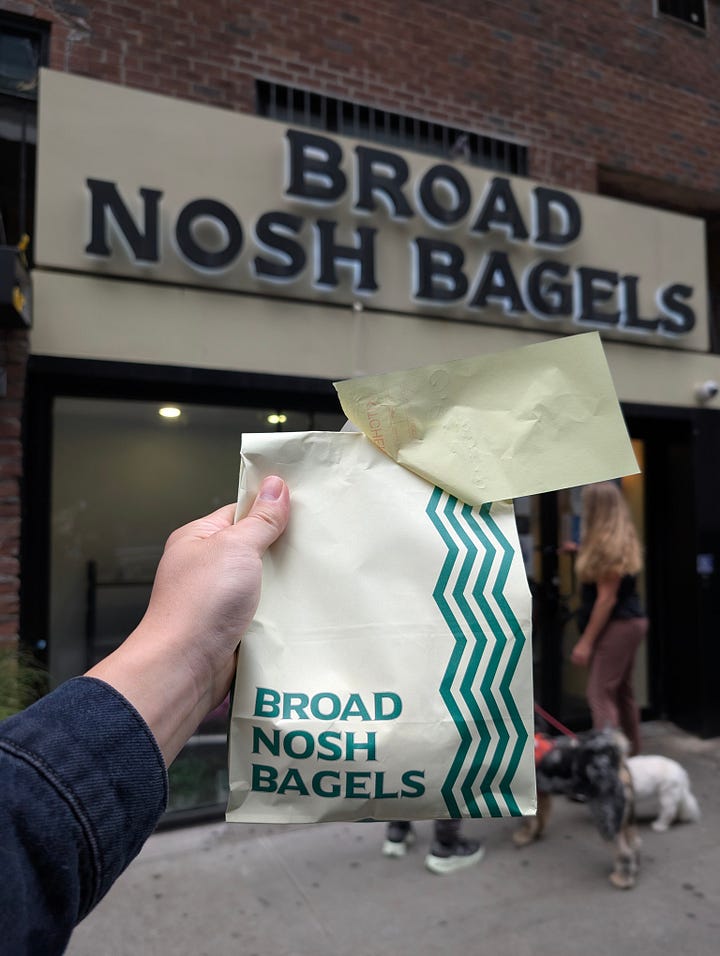
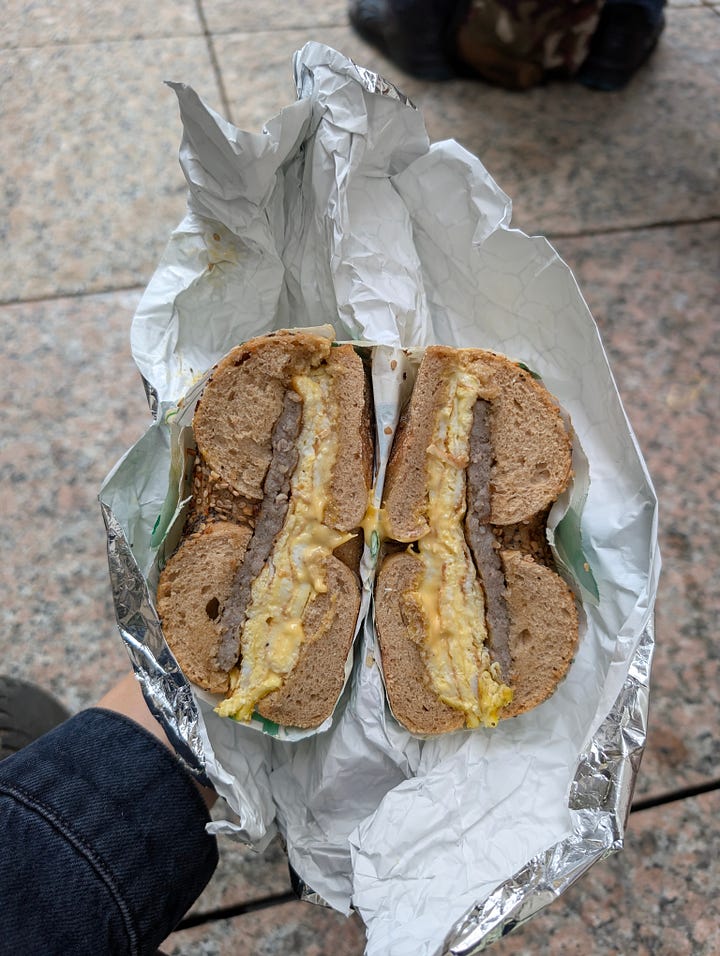
Nourishment locked in for the morning, I head to the Walter Reade Theater’s lobby to pick up my press badge. This is my second year covering NYFF and it feels really cool to hold this pass in my hands. I still don’t really know how I got accredited last year but it really opened some doors for me. Very glad to be back!
Last year I likened the press experience to summer camp but on this sophomore outing it feels more like back to school. Faces have become familiar, and now I'm friends with some working critics. Doesn’t hurt that the Walter Reade reminds me of the largest classrooms from college, and there are always Julliard kids milling about; the building that holds this theater also contains dorm rooms.
I queue up in front of the theater, my adopted home for the next three weeks. This is another big difference between NYFF and other fests, in terms of the press experience: instead of an online reservation system, everyone lines up for P&I screenings and it’s first come, first seated. There are two classes of press badges: one for important and/or old people, and one for plebs like myself. It’s a more democratic system but you do have to arrive a couple hours early for the more hotly anticipated titles. (The select few with orange badges can roll up ten minutes before.) Last year I got into every movie I wanted to see, but there’s always a risk of missing out, and having to be at Lincoln Center before 8AM for those big titles really wore me down.
Got here quite early, so I’ll have no trouble getting into the first screening. I don't mind because I need all the time I can get to work my actual job. Most others read a book or scroll on their phones, the more industrious of us are filing their reviews. I'm probably the only one here writing database models. I also eat my bagel.
That was a long preamble… the rest of these dispatches will be shorter. Let’s talk movies!
Miroirs No. 3
Screens October 6, 7, and 9. Release plans TBA via 1-2 Special.
It's like you're my Miroirs / My Miroirs staring back at me. 🎶
Unfortunately there is no Justin Timberlake needle drop but we do get a whole scene devoted to “The Night” by Frankie Valli. I imagine it was inspired by the captivating opening scene of The Tsugua Diaries.
After surviving a deadly car crash with barely a scratch, conservatory student Laura (Paula Beer) convalesces in the home of Betty (Barbara Auer), who witnessed the accident in front of her isolated home. Laura’s boyfriend was killed in the crash, but if she’s grieving, she doesn’t externalize it. A reunion with Betty’s estranged husband and son reveals that they too are dealing with loss.
Unfairly dismissed as a minor work from Christian Petzold, the title provides a key of how to view this film: as one movement in a larger series (though this is Paula Beer’s fourth time starring in a Petzold movie, not the third). The film feels a lot like a short story: diversionary and minor key but satisfying just the same. Features a typically German sense of humor, as dry as the rieslings consumed at the dinner table.
The plot brings to mind another movie. Misericordia is also a rural romp about a family whose mourning is upended by the appearance of a cosmopolitan newcomer, with elegant digital cinematography capturing its pastoral setting. But the tone is very different, and a good example of the contrast between French and German modes of storytelling. One is chaotic, the other controlled.
Tasting Notes: Königsberger Dumplings, Laura’s specialty in the kitchen, and the family makes a plum cake using fruit plucked by the river. It was made with yeast dough but Betty’s son prefers shortcrust pastry.
Getting out of the theater I see wet concrete and I shudder, but thankfully it's just a light drizzle. I use my preferred bathroom in the lobby of David Geffen Hall and answer some Slack messages at my job and before I know it, it’s time to go back inside.
The Mastermind
Screens September 27 and 28. Opens in theaters October 17 via Mubi.
I’m now 0/2 for movies in which Josh O’Connor plays an art thief and directed by filmmakers whose previous films I really admire. The actor is in his usual form as a sweaty, scuzzy loser whose plans to steal some abstract paintings goes hilariously awry. I did laugh quite a bit, but I otherwise found Kelly Reichardt’s picaresque to be a misfire. It’s formless and flighty, a two hour windup to an admittedly very funny punchline of cosmic indifference. Setting this in the early 1970s, at the height of anti-Vietnam War protests gives the film a point of view, politics-wise, but it’s not particularly insightful. The period does lend to some very stylish costumes, and the drum-driven jazz quartet score is quite nice.
I’m very much in the minority, as everyone else I talked to afterwards were into it. So maybe ignore me on this one!
Tasting Notes: Set in suburban Massachusetts (specifically Framingham), everyone is eating boring suburban fare. Boiled green beans and carrots, mashed potatoes, chicken breast. Steak with hella BBQ sauce, dinner rolls, boiled peas. Fried eggs and bacon. It’s the kind of conformity that the titular “mastermind,” an art school dropout and recovering hippie, seeks to escape.
I’m starting to get hungry so before the next movie I eat a couple energy bars I had packed. A lifeline!
Late Fame
Screens September 28, 29 and October 3 and 7. Seeking distribution.
This premiered at Venice and got a pretty mixed reception, but perhaps those Europeans were not the right audience. It’s a very New York movie that I think will play like gangbusters in its hometown. Of the nine movies I’ve seen so far at the festival, this has been my favorite; others I spoke with liked it too. I’ll write a longer review at some point.
Willem Dafoe is in prime Willem Dafriend mode in this sympathetic satire. Late Fame is set in a downtown Manhattan where the old buildings still recall a bohemian past, but have since been gut renovated. “I know this place, it used to be called something else” is a familiar refrain for old-timers like Ed Saxberger (Dafoe), once a poet involved in the artistic scene of the 1970s, now a career employee of the Postal Service. His quiet routine—drinks and billiards at his local, rent-controlled SoHo apartment—is disrupted when a young man by the name of Meyers (Edmund Donovan) shows up at his doorstep with a copy of his long out of print poetry collection.
Meyers represents a collective of Gen Z aesthetes who re-discovered Ed’s work and want to champion him as an unfairly lost poet. They want him to compose a new work—his first in decades—for an upcoming reading that they hope will re-ignite the city’s literary traditions. Though their intentions are earnest, they all come from generational wealth and can merely gesture at the authenticity of the starving artist. The only true bohemian in the bunch is also the only woman, and she happens to be a bit older than the fresh-faced twentysomethings: Gloria Gardner (Greta Lee), an actor and cabaret performer who channels the glamorous desperation of the likes of Sally Bowles and Norma Desmond. Her dramatic entrance into this film involves absinthe and (probably faux) furs. Needless to say, Ed is captivated.
But this film isn’t really a May December romance, though it was scripted by Samy Burch, the writer of May December. Like that soapy psychodrama, Late Fame skewers its characters while also taking them seriously. It's also not much of a stretch to say that director Kent Jones, a longtime fixture of the New York film scene, has also injected his own personal experience into the film.
A big part of what makes Late Fame work is Dafoe's lived-in, sprightly performance. Most of the time Ed comes off as a humble blue-collar artist. (“You know, I'm something of a poet myself.”) But there’s a couple moments where the mask slips and Dafoe gives us a bit of the Green Goblin, revealing a reservoir of aggrieved indignity for his talents having gone so long unnoticed.
There’s a metatextual element at play: this is based on a novella written by Arthur Schnitzler in 1895 but never published. After its own re-discovery, the Vienna-set story has been adapted for contemporary times. Late Fame premiered at Venice and got a pretty mixed reception, but perhaps those Europeans were not the right audience. It’s a very New York movie that I think will play like gangbusters in its hometown. Of the nine movies I’ve seen so far at the festival, this has been my favorite, so I hope that this film finds its audience upon release. Rediscoveries are exciting but also sad.
Tasting Notes: Two bars are prominent locations in this movie, and I’m trying to figure out where they are IRL. Ed’s longtime pub has a pool table in the back, which can describe almost every neighborhood bar, but the walls are painted with a distinctive light blue. I checked all the SoHo locations on the Pool Tables NYC map but none have blue walls, so perhaps the location is in a different neighborhood.
The other bar we spend time in is the meeting place of The Enthusiasms Society. Presumably also in SoHo/West Village, it has two stories. Up on the loft are a mismatch of chairs and benches and couches and a lot of light coming in through the window. If you have any leads on what either place could be, please share and I’ll check it out.
I walk a quick lap outside before the final movie of the first day of NYFF!
No Other Choice
Screens October 9, 10, 12, and 13. Opens in theaters December 25 via Neon.
Park Chan-Wook’s newest movie has him firmly in his element with a murderous tale told in maximalist fashion. Lee Byung-hun walks his director’s tightrope with aplomb as Man-su, a family man and devoted employee of a paper manufacturer who is laid off after the firm is acquired by American investors. After thirteen months of excruciating unemployment, he decides to take matters into his own hands. His plan to create a job vacancy and eliminate the subsequent competition is one that Nathan Fielder would be proud of, at least until things fall sideways in slapstick fashion. (The Mastermind would be a great alternate title.) Man-su is just doing what he thinks is needed to get ahead in the age of automation. But No Other Choice? There always is.
Those unfamiliar with Park’s oeuvre should be advised to check their squeamishness at the door. It may or may not help that everything is portrayed with gleeful aplomb. Just like Decision to Leave, the director’s previous movie, all of the sicko transitions, composite shots, and POVs are such a crazy delight to witness; the filmmakers were clearly having fun in the edit bay. No Other Choice has been positioned as a counterpart to Parasite, but the socioeconomic allegory in this film is quite muddled compared to Bong Joon-ho’s masterpiece. This film doesn’t quite get to that level.
Tasting Notes: Grilled eel and Korean fried chicken make prominent appearances. This movie might get you hungry if the blood and viscera don’t get to you.
There is no shortage of Korean restaurants throughout the five boroughs, ranging from pochas best experienced after five shots to Michelin tasting menus and everything in between. The first instinct for a post-No Other Choice night out would be to Ktown, where there are many fine options, but if you want jangeo-gui (장어구이, grilled freshwater eel), you’ll want to head to Yuk Jun Gui in Flushing, which is apparently one of the only places that serve it. (Real heads know that the best traditional Korean food is in New Jersey; my friend Pearl points me to Jang-eo Jip (장어집) in Palisades Park—eel is literally in the name of the restaurant—but cautions that her parents don’t think there’s a great spot anywhere for 장어구이.) It looks very easy to make at home though; looks like H-mart carries non-marinated eel. Maybe I should through a No Other Choice dinner party?
The most trendy Korean fried chicken restaurant would be Coqodaq, but the prices and vibe are out of reach for the characters in this film. Better to go to a more humble joint: I have many fond memories of eating at Turntable, with my wings and drums lubricated with beer towers; one location also has karaoke rooms.
But really, the drinking’s the thing. There are Hong Sang-soo levels of alcohol consumption in No Other Choice. Jinro is imbibed by the case. You may feel compelled, as I was, to go out for a round of soju bombs after a particularly bravura shot from the perspective of the bottom of a pint glass. Just drink responsibly.
For Korean-American cocktails, bar snacks, and somaek aplenty, I’m a fan of Orion Bar in Bushwick. Their beer and soju brands of choice happen to be the same as in No Other Choice: Terra and Jinro. This was where I hosted my food pop-up in July; I’ve been meaning to write about that experience but it’ll have to wait until after NYFF.
As we filed out of the auditorium, I overheard someone saying they always find Park Chan-wook’s movies to be “emotionally empty” and I briefly dwell on the possible implications of that statement until my stomach starts rumbling again.
I have leftovers at home, but since it was the first day of screenings I decided to commemorate it with a trip to Flame Diner with Ryan and Doug. It’s several blocks south of the Lincoln Center and open 24 hours a day, making it a reliable late night option when you get out of a movie late and everything else closes at 10 PM. They serve the usual diner fare at very reasonable prices. I spent $30 (including tax and tip) on veal parm with spaghetti. Was it the best one I’ve ever had? No, but it hit the spot and filled me up. I was so hungry!
When I got home I typed up all my screening notes from the day, which always takes longer than I think it should. Then time for bed and start it all over again tomorrow!
In the next dispatch: wrapping up Week -1 with initial reactions to Peter Hujar’s Day, The Secret Agent, Sirât, Magellan, and Rose of Nevada.
Sundance/Berlin/Cannes/Venice/Toronto/Telluride
For example, Venice screens for critics the morning of the world premiere, giving writers just a few hours to gather their thoughts, write something coherent, and run it by an editor if there is one.



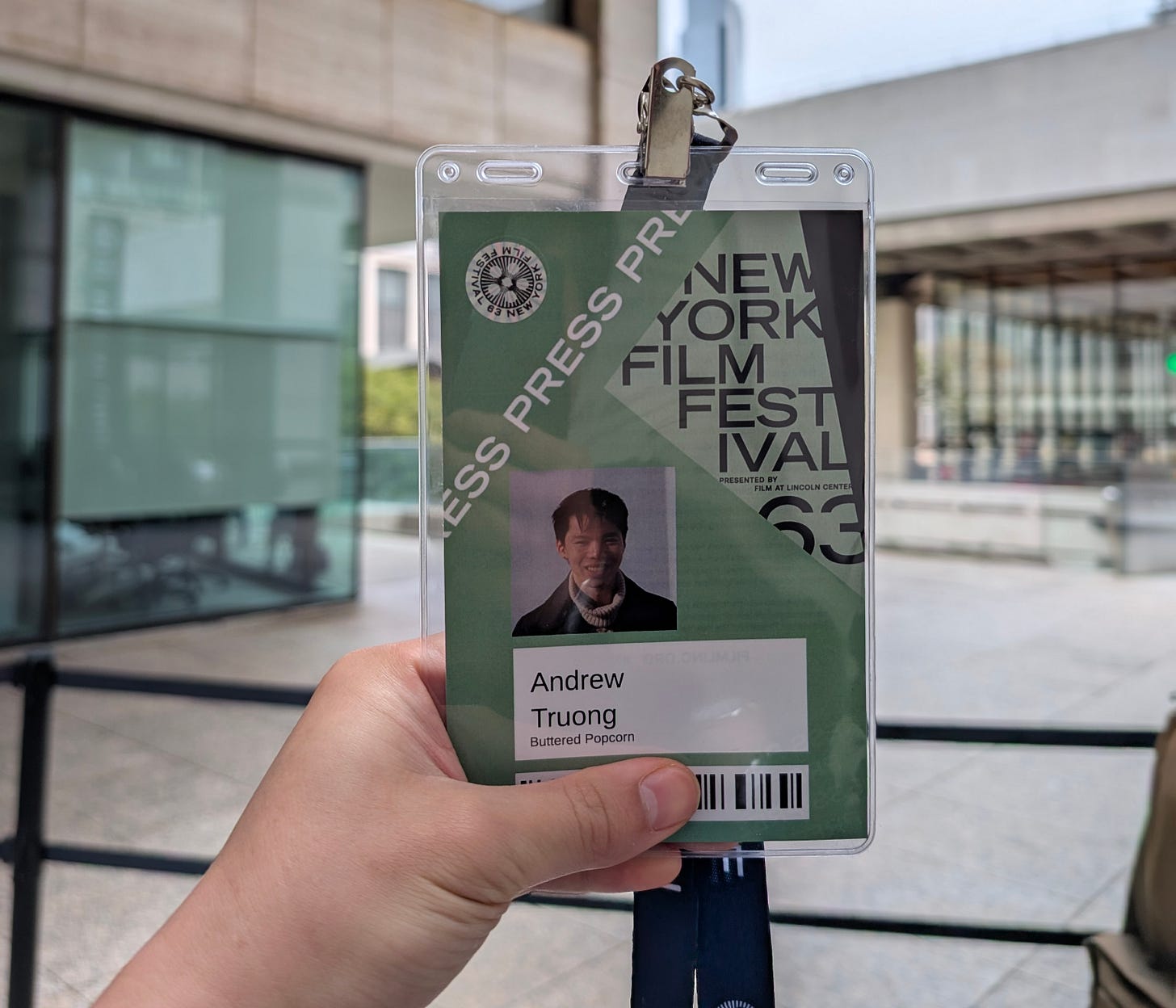

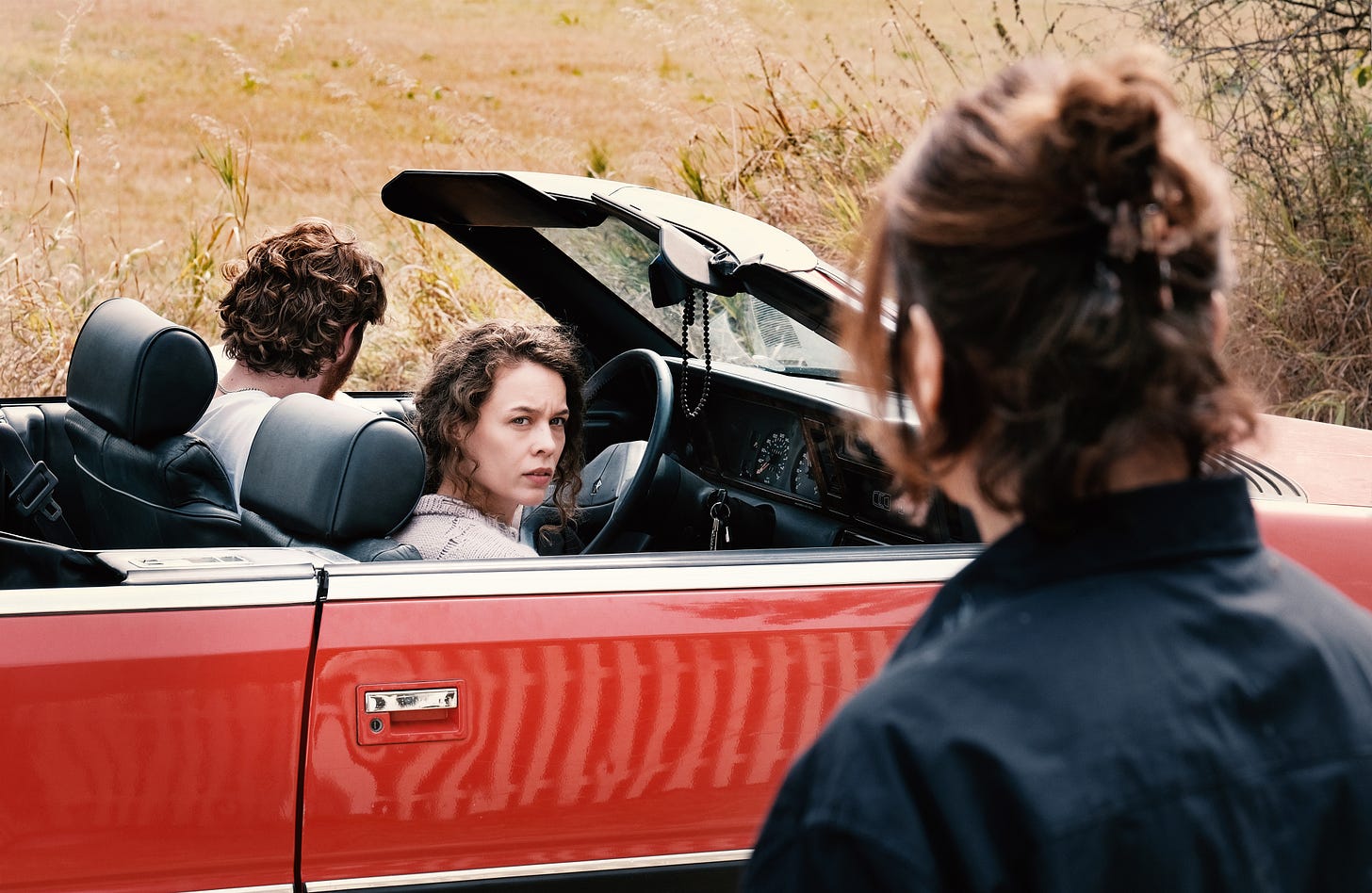
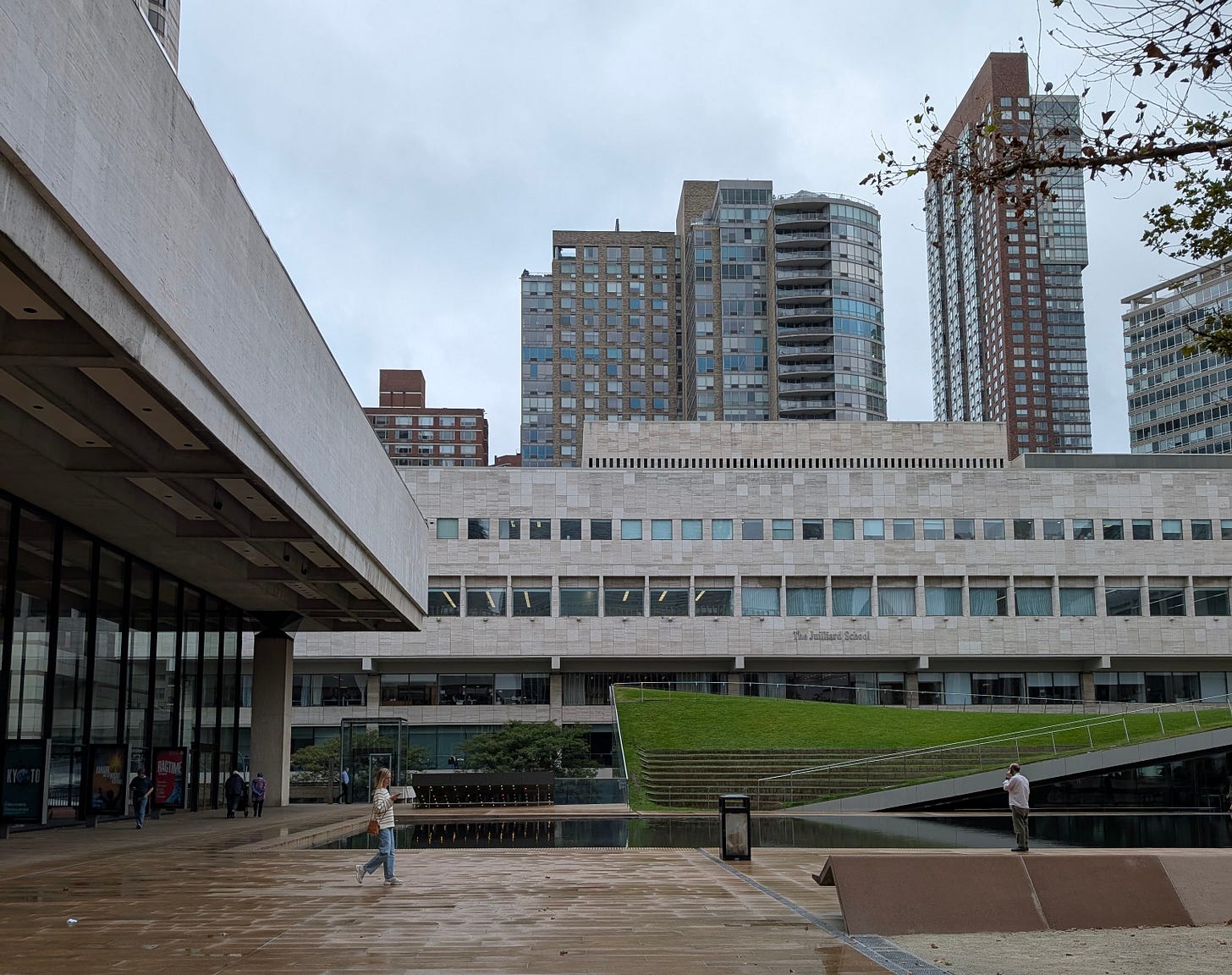
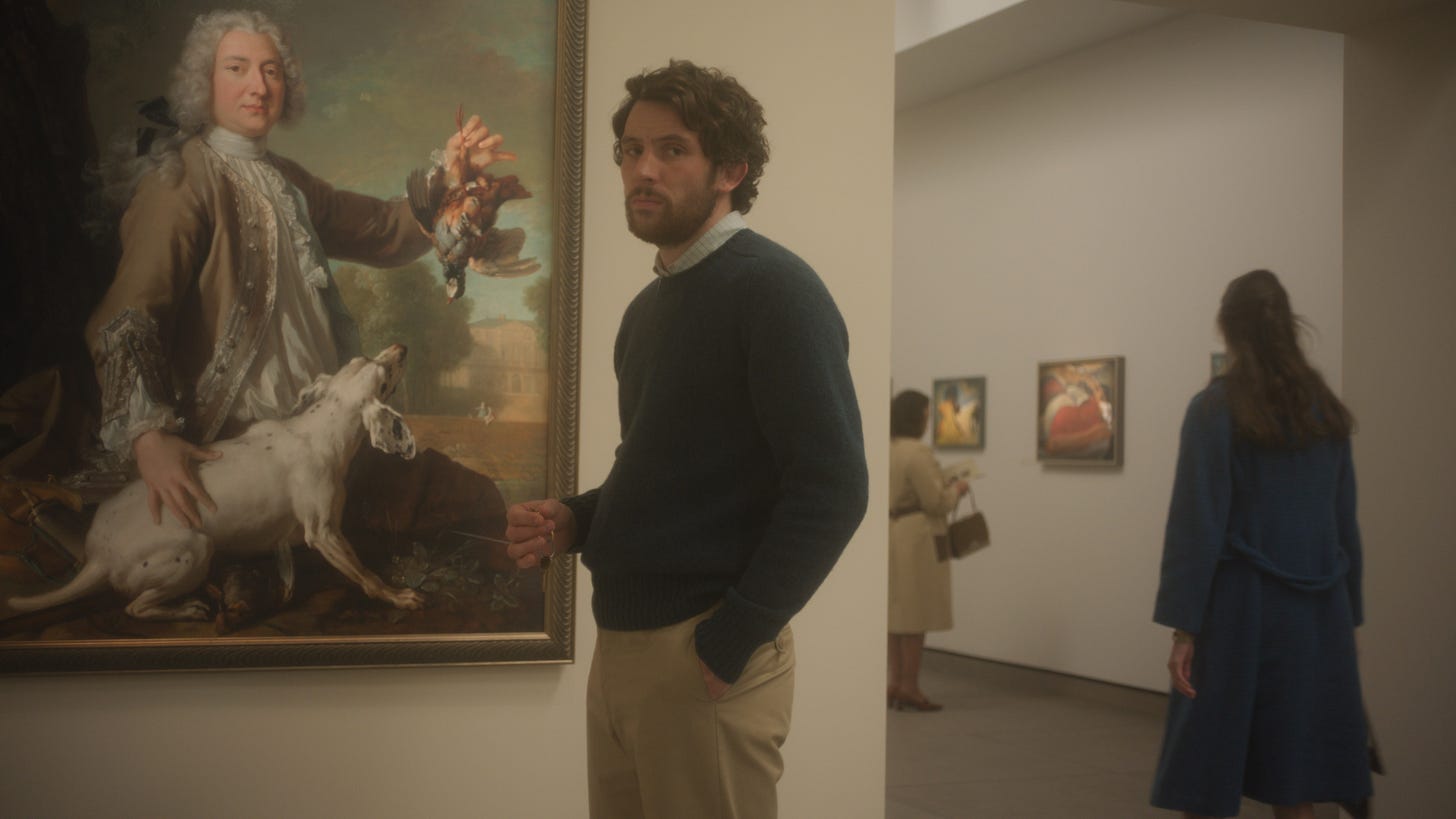
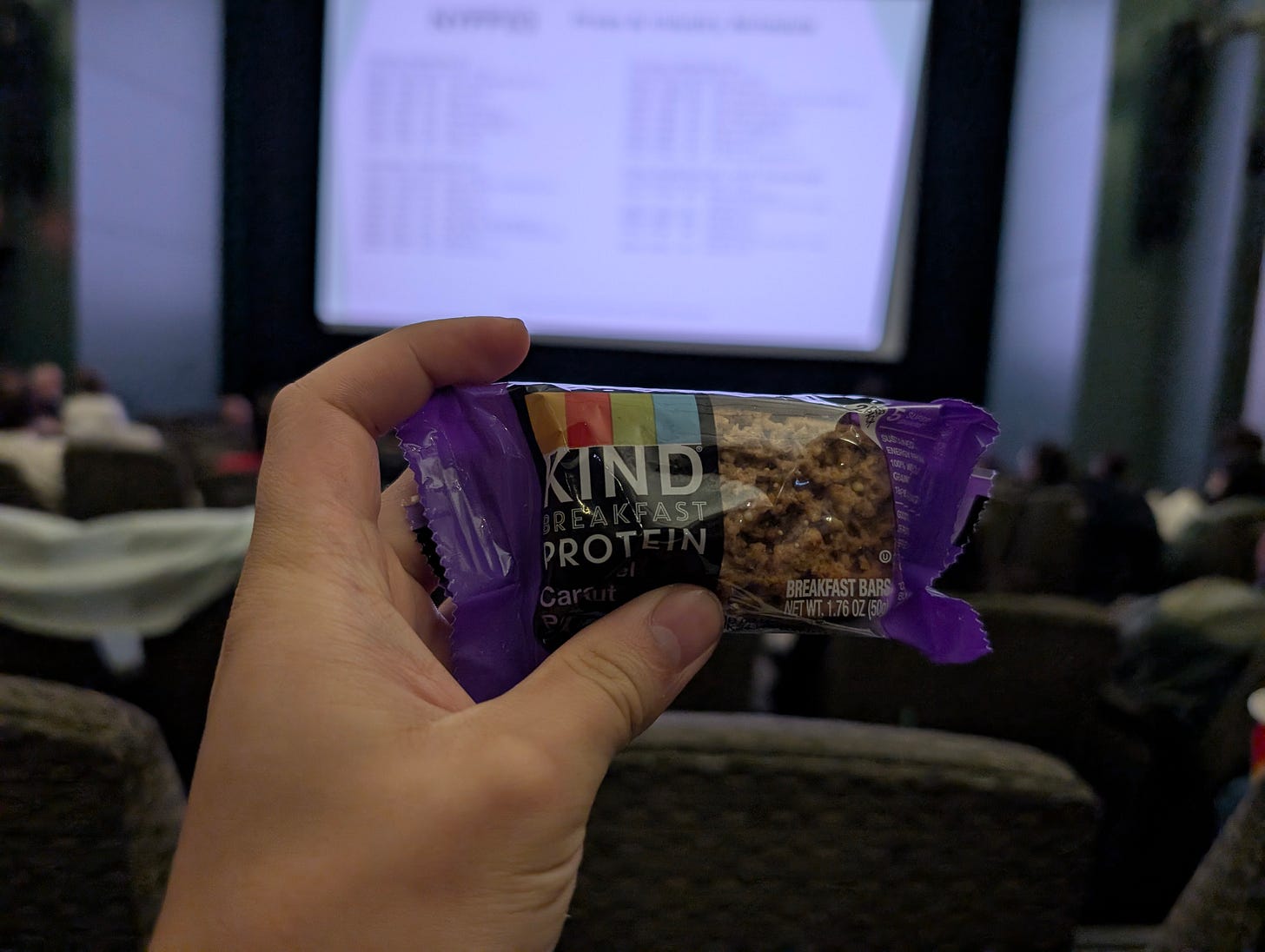
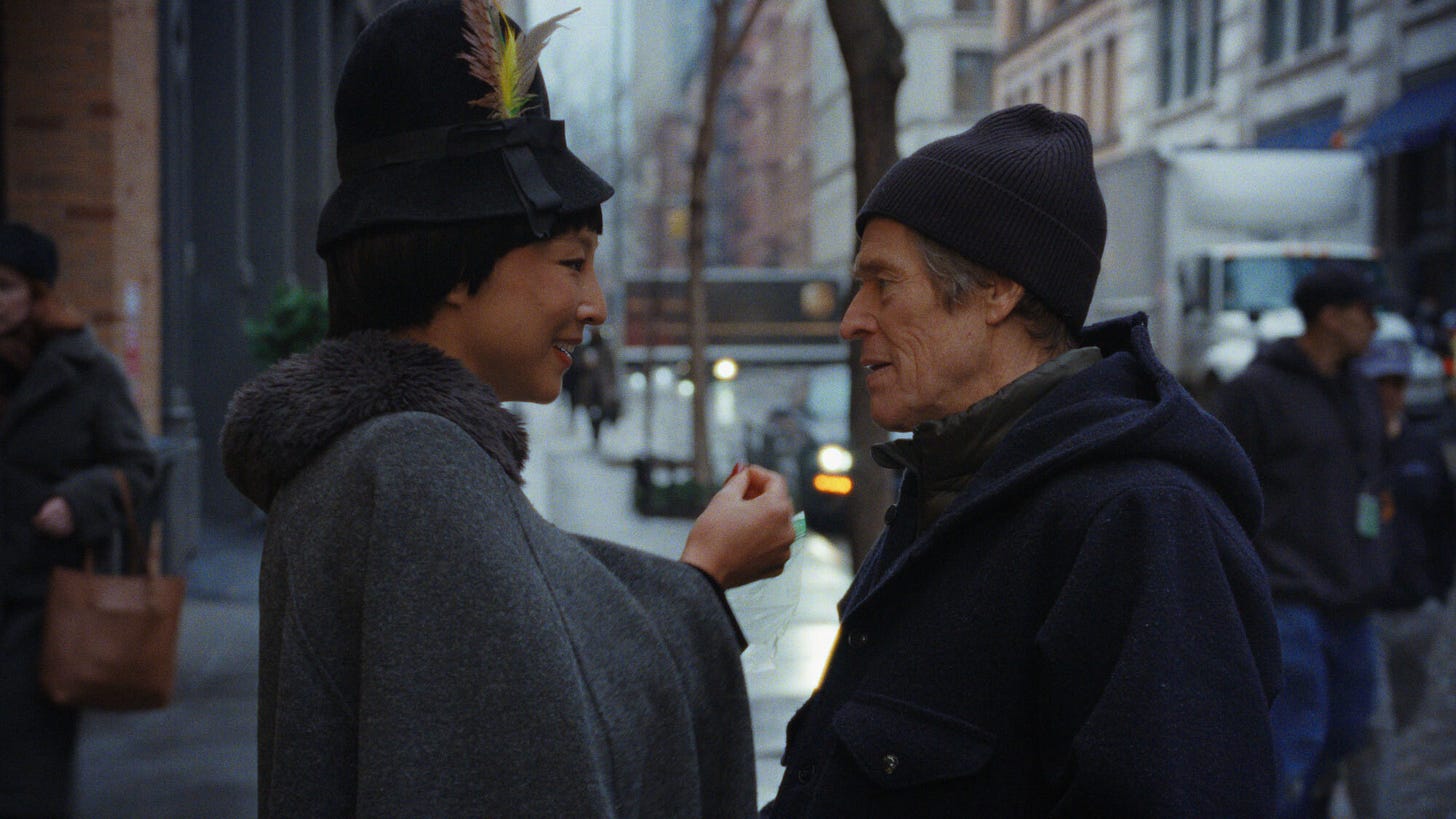
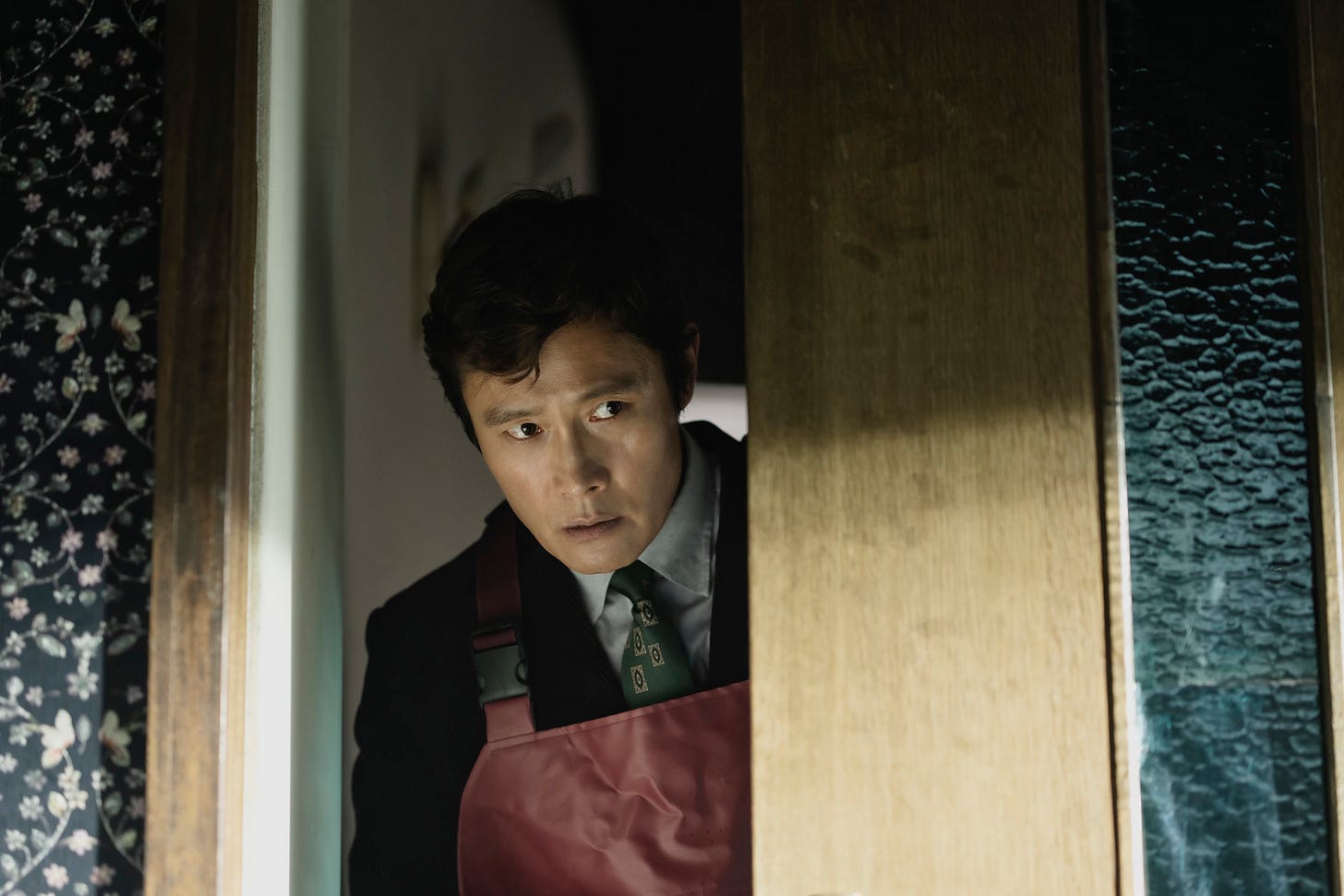
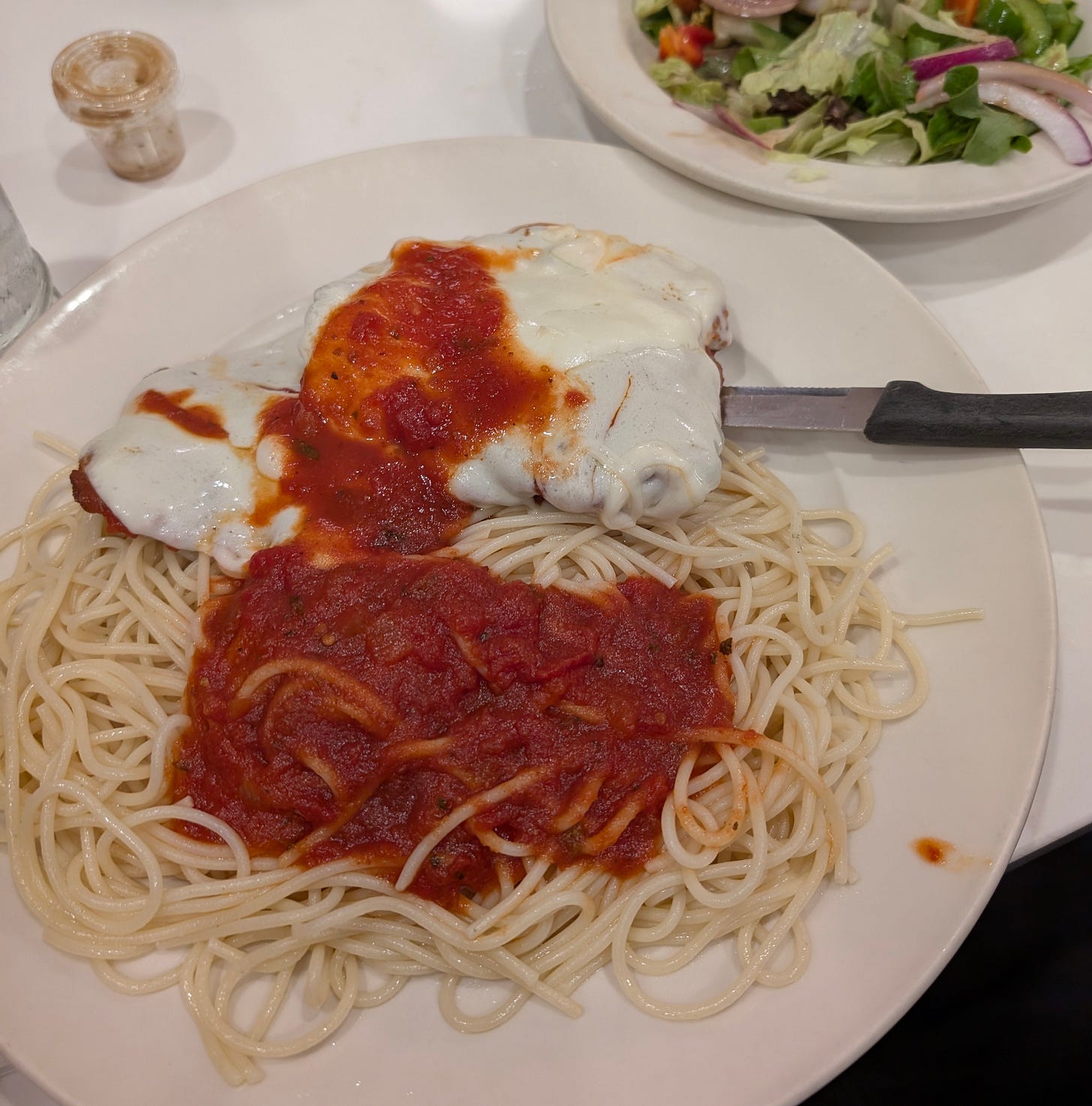
great stuff. need to try all these restaurants. you have great taste!
Late Fame sounds like something I'd like! And as for figuring out where those mystery bars are - challenge accepted 🫡